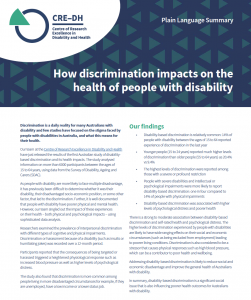How discrimination impacts on the health of people with disability
Discrimination is a daily reality for many Australians with disability and few studies have focused on the stigma faced by people with disabilities in Australia, and what this means for their health.
Our team at the Centre of Research Excellence in Disability and Health have released the results of the first Australian study of disability-based discrimination and its health impacts. The study analysed information on more than 6000 participants between the ages of 15 to 64 years, using data from the Survey of Disability, Ageing and Carers (SDAC).
As people with disability are more likely to face multiple disadvantage, it has previously been difficult to determine whether it was their disability, their disadvantaged socio-economic position, or some other factor, that led to the discrimination. Further, it is well documented that people with disability have poorer physical and mental health. However, our team singled out the impact of these experiences on their health – both physical and psychological impacts – using sophisticated data analysis.
Researchers examined the prevalence of interpersonal discrimination with different types of cognitive and physical impairments. Discrimination or harassment because of a disability (such as insults or humiliating jokes) was recorded over a 12-month period.
Participants reported that the consequences of being targeted or harassed triggered a heightened physiological response such as increased blood pressure as well as higher levels of psychological distress.
The study also found that discrimination is more common among people living in more disadvantaged circumstances for example, if they are unemployed, have a low income or a lower status job.
Research findings
- Disability-based discrimination is relatively common: 14% of people with disability between the ages of 15 to 64 reported experience of discrimination in the last year
- Younger people (15 to 24 years) reported much higher levels of discrimination than older people (55 to 64 years) as 20.4% vs 9.4%
- The highest levels of discrimination were reported among those with a severe or profound restriction
- People with severe disabilities and intellectual or psychological impairments were more likely to report disability-based discrimination: one in four compared to 14% of people with physical impairments
- Disability-based discrimination was associated with higher levels of psychological distress and poorer health
There is a strong to moderate association between disability-based discrimination and self-rated health and psychological distress. The higher levels of discrimination experienced by people with disabilities are likely to have wide ranging effects on their social and economic circumstances (such as being excluded from employment) leading to poorer living conditions. Discrimination is also considered to be a stressor that causes physical responses such as high blood pressure, which can be a contributor to poor health and wellbeing.
Addressing disability-based discrimination is likely to reduce social and economic disadvantage, and improve the general health of Australians with disability. In summary, disability-based discrimination is a significant social issue that is also influencing poorer health outcomes for Australians with disability.
About the Survey
We used the Confidentialised Unit Record Files of the Survey of Disability, Aging and Carers (SDAC) 2015, a repeat cross-sectional national survey conducted by the Australian Bureau of Statistics (ABS).
The total sample size was 74,862.
Our analysis was restricted to 40,872 working age adults (15-64 year olds) of whom 15.1% (6,183 people) reported a disability.
- This is a summary based on the original article. Read it here:
Krnjacki L, Priest N, Aitken Z, Emerson E, Llewellyn G, King T & Kavanagh. Disability-based discrimination and health: findings from an Australian-based population study. Aust NZ J Public Health 22 November 2017. - Download the Plain English Summary (pdf file)

Read the Croakey article | Download the Plain English Summary
Read the Media Release or Email us for your own copy of these articles
